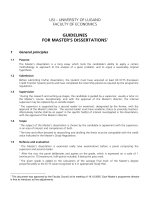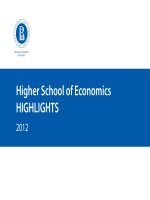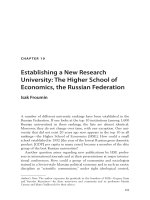KENYATTA UNIVERSITY SCHOOL OF ECONOMICS potx
Bạn đang xem bản rút gọn của tài liệu. Xem và tải ngay bản đầy đủ của tài liệu tại đây (487.13 KB, 8 trang )
SCHOOL INFORMATION BOOKLETSCHOOL INFORMATION BOOKLET
KENYATTAKENYATTA
UNIVERSITYUNIVERSITY
SCHOOL OF ECONOMICSSCHOOL OF ECONOMICS
The Fittest Survive
PREAMBLE
Most world class Universities have moved away from restrictive structures of
departments of economics towards more all-encompassing schools of economics as
their mark of distinction. The London School of Economics is an obvious example.
The discipline of economics consists several branches that have over the years grown
and developed their own methodologies. These branches have their theoretical and
practical aspects that play a central role in policymaking and resource allocation in all
the sectors of the economy. This has made the discipline very popular with students
and other professionals alike. The Kenyan Government has set 2030 as the year
Kenya should have achieved the Newly Industrialized Country's status. This implies
that the department of economics needs to redefine its academic and research agendas
so as to remain relevant in an evolving economy, and immensely contribute towards
the much needed human capital and policy oriented research designed for the
achievement of greater socio-economic aspirations of the country.
VISION
The vision of the school is to be an exquisite centre of academic excellence in the
promotion, capacity building, research and consultancy in economics for both local
and international arena.
MISSION
To undertake and provide teaching, research, economic policy analysis and
consultancy services that are responsive not only to the professional needs of local,
regional and international institutions, but also to those of the local community in
both the formal and informal economic sectors.
OBJECTIVES
The main objectives of the school are to:
a. Provide training focusing on economic theory, econometrics and applied
economics.
B.
Undertake both academic and policy driven research.
c. Provide consultancy services in such core areas as project planning,
monitoring and evaluation, econometrics, and applied economics.
d. Promote community service programmes in applied economics and related
programmes.
e. Promote co-operation and linkages between its core departments on the one
hand and the local, regional and international organizations and institutions
on the other.
Kenyatta University - School of Economics
11
22
The Structure of the School
The structure of the School comprises the following:
a. Dean's office
b. Three teaching departments:
i. Department of Economic Theory
ii. Department of Econometrics and Statistics
iii. Department of Applied Economics
ACADEMIC PROGRAMMES
UNDERGRADUATE PROGRAMMES
Bachelor of Economics and Finance
Bachelor of Economics and Statistics
Bachelor of Economics (Finance)
ENTRY REQUIREMENTS
a) To be admitted into the undergraduate programmes, potential candidate
must have attained the minimum requirement of KCSE C+.
b) Candidates taking a degree course within the School of Economics will be
required to have at least C+ in the following subjects: Physics or Chemistry
or Biology, English or Kiswahili, a Humanity or a Commercial subject. In
addition, candidates should have obtained at least a B- in Mathematics.
Candidates with A-level qualifications or its equivalence will be considered,
on condition that they attain at least 2 principals and a credit in
Mathematics.
DURATION
The undergraduate degree programme extends over period of four (4) academic
years.
MASTERS PROGRAMMES
a) Master of Economics
b) Master of Economics (Finance)
c) Master of Economics (Development)
d) Master of Economics (Policy and Management)
e) Master of Economics (Environment)
f) Master of Economics (Health)
g) Master of Economics (Agriculture)
h) Master of Economics (International Trade & Finance)
School Information Booklet
Kenyatta University - School of Economics
33
ENTRY REQUIREMENTS
The following shall be eligible for admission into the Masters programmes in the School
of Economics:
a) A holder of at least an Upper Second Class Bachelor's Degree in Economics,
Economics and Statistics or Economics and Finance from Kenyatta University
or any other recognized Institution of comparable status.
b) A holder of a Lower Second Class degree in the stated disciplines from Kenyatta
University or any other recognized university with 2 years relevant experience.
DURATION AND STRUCTURE
a) The Masters programmes consists of coursework, examination and research
project.
b) The programmes are offered in two modules, full-time and evening with
students in both modes being required to take at least a total of sixteen (16) units
by the end of the programme.
c) In the first year of study, a student is required to take eight units: four units in the
first semester, and four in the second.
d) During the second year of study, a student takes four (4) units in the first
semester and undertakes a research project in the second semester. The research
project is equivalent to four units
E) The duration of the programmes is a minimum of 18 months from the date of
registration.
PH.D PROGRAMMES
DURATION AND PATTERN
PREAMBLE
This Ph.D. programme by coursework, examination and thesis provides an alternative to
the existing Ph.D. programme, which is by thesis only. While a student can choose
between the two programmes, the former has been developed specifically to incorporate
coursework into Ph.D. training in Economics at Kenyatta University.
RATIONALE
The growing demand for Economists outside academia and the under-funding of
44
School Information Booklet
universities have led many of those who remain in Africa, and would like to access
further training to enable them become consultants for both local and international
organizations, feel short-changed by our education system. The PhD programme by
coursework, examination and thesis seeks to fill that gap by training economists at
PhD level for both the public and private sectors.
Most local Ph.D. Programmes in Economics are by thesis only. Often, they fail to
expose the student to frontier analytical tools in economics theory and research,
which are valuable to the modern scholar. The emerging environment puts a
premium on local scholars who are strong in analytical skills. This calls for a new
Ph.D. programme that offers an effective mechanism for addressing that challenge.
ENTRY REQUIREMENTS
a) Candidates shall be holders of at least Masters Degrees in Economics from
Kenyatta University or from another institution of comparable status, and
these degrees must be based on coursework, examination and research
project or coursework, examination and thesis.
b) To be selected to the programme, the student will have completed master's
level course work in the following three core courses: Microeconomic
Theory, Macroeconomic Theory and Quantitative Methods
DURATION AND STRUCTURE
The PhD programme extends for a period of not less than eight (8) semesters from the
date of registration. It is by coursework, examination and thesis
In the first year of study, candidates take seven core units; three units in the first
semester, and three in the second semester and an independent paper that is
equivalent to one unit. The six units are examined before proceeding to second year.
A candidate who had not taken the Economics Research methodology course (EAE
501) at Masters Level is required to take the course at the said level.
In the second year of study, candidates take four units, two from each field, in the first
semester. The electives are offered at the discretion of the School of Economics.
During the second semester a student works with the supervisor to select the area of
specialization and also to prepare for comprehensive examinations in each of four
areas (Microeconomic theory, Macroeconomic theory, and two elective fields of
Economics), which he/she sits for at the end of that semester. On successful
completion of the comprehensive exams in the second semester the student proceeds
to the thesis stage (to register for EAE: 620 (Thesis). Three seminars shall be
Kenyatta University - School of Economics
55
organized to assist students during their research phase.
66
School Information Booklet
For more information, please Contact:
The Dean,
School of Economics
Kenyatta University,
P.O. Box 43844,
NAIROBI, 00100, KENYA
Tel: 810901-19 Ext: 57465/ 57325
E-mail:









